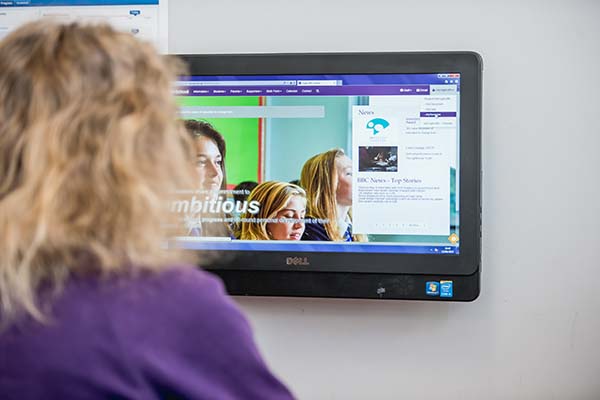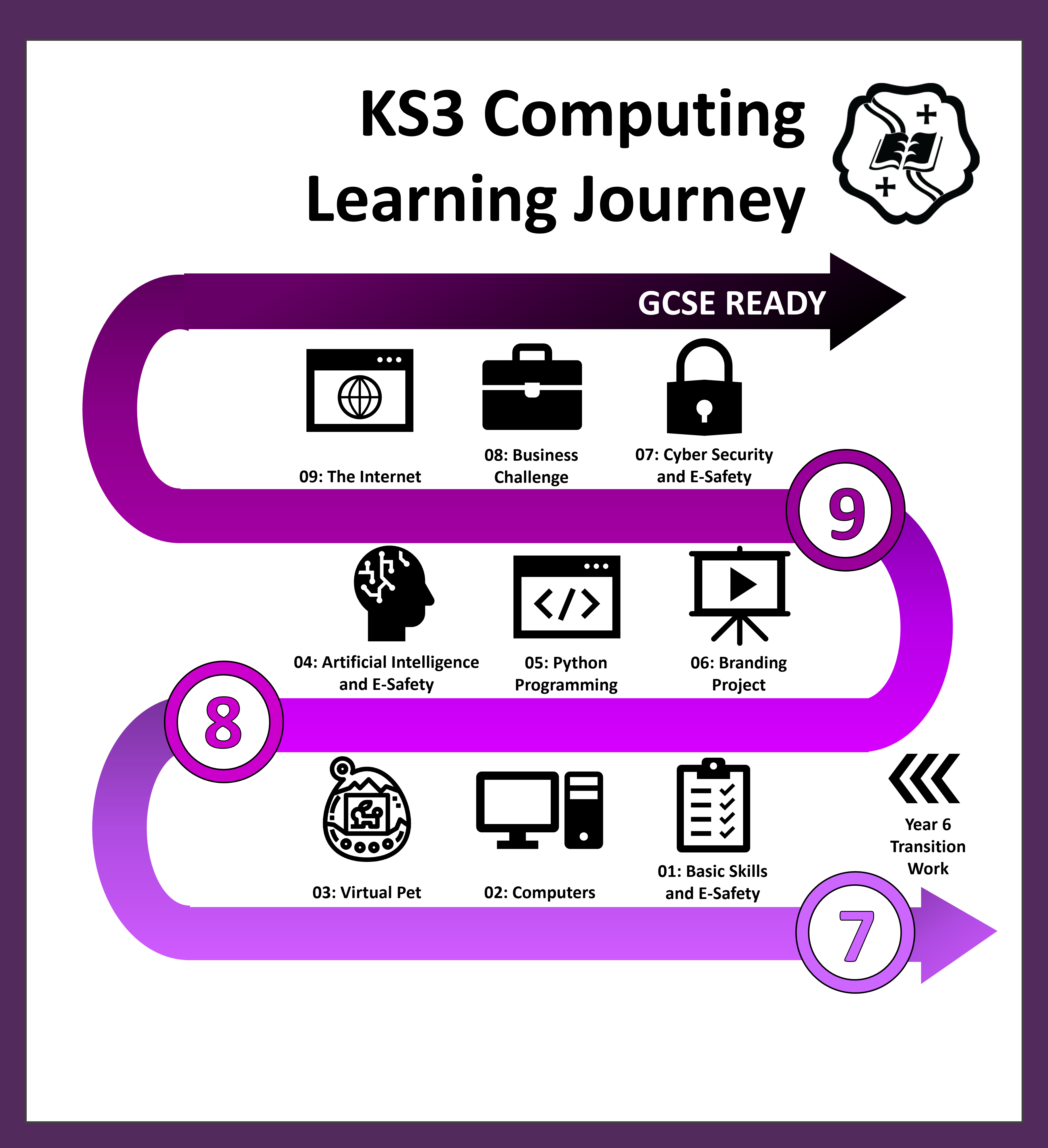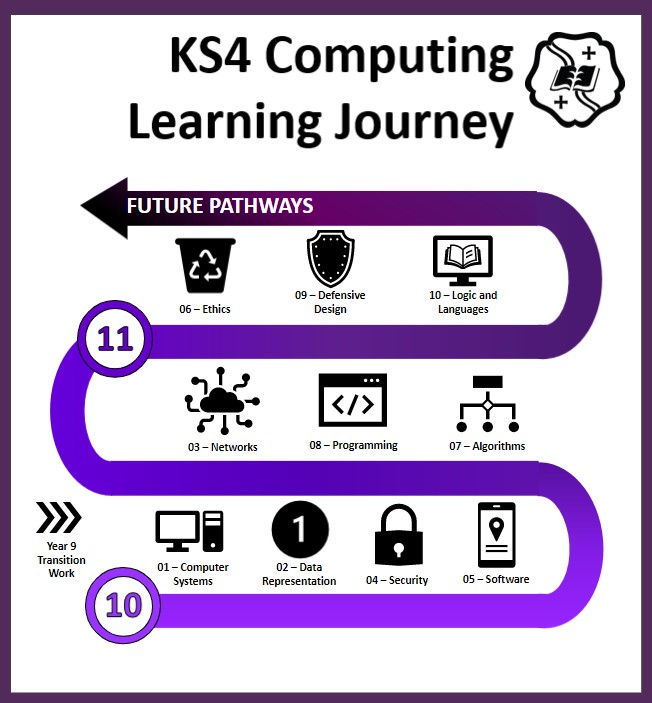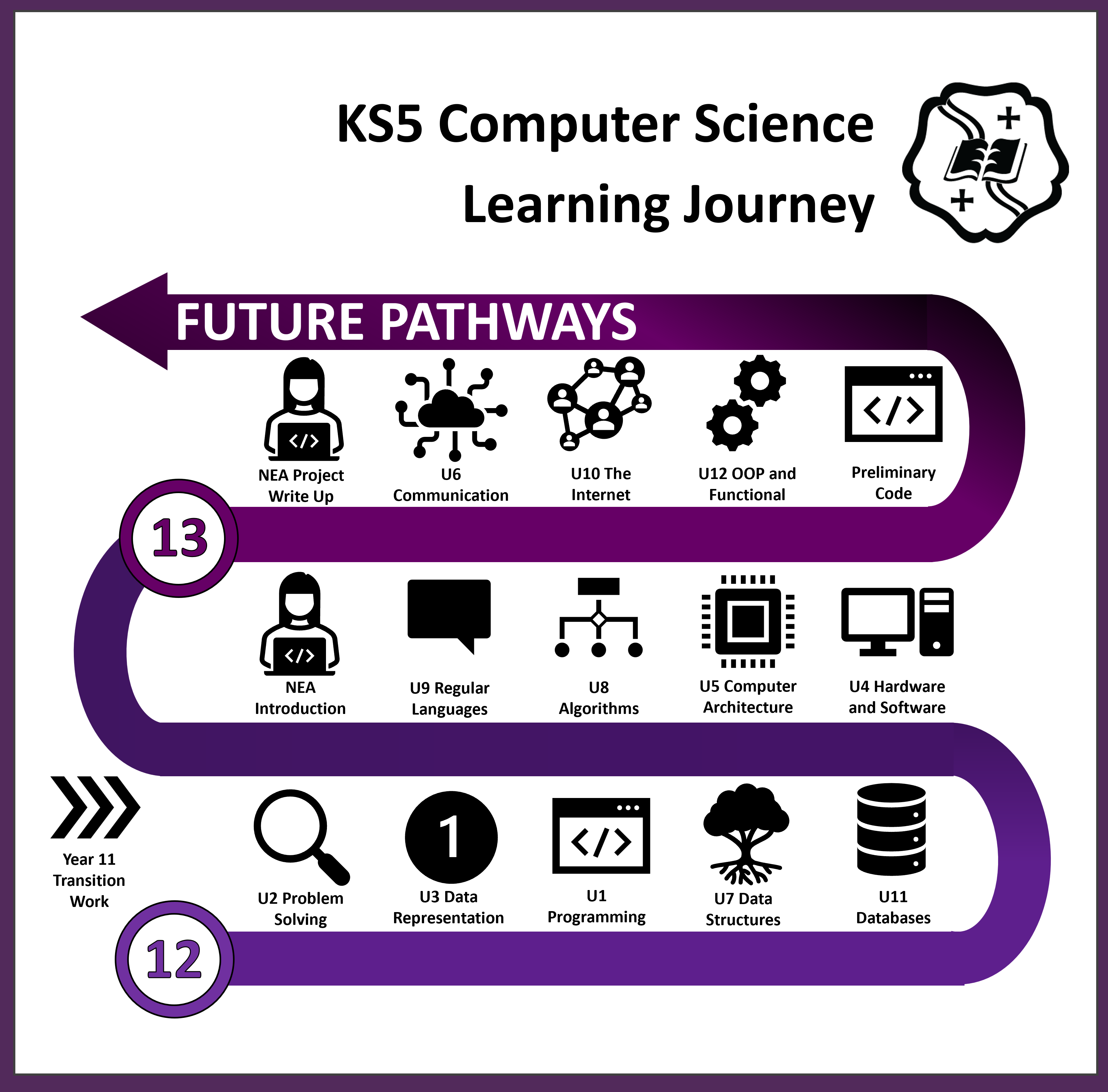
To equip our students with the necessary skills and knowledge to develop their social, economic and technological awareness, and to enrich their employability skills to help inform them of the various careers available. Whether its probelm solving, teamwork, creativity or resillience, we prepare our students for any future pathway, even those outside the realm of Computer Science.
Students' learning across Key Stage 3 encompasses the following areas: Digital literacy with Office 365; E-Safety; How computers work; Algorithmic problem-solving skills; Programming; Artiificial Intelligence; Cyber security; How businesses work.

Our GCSE in Computer Science is engaging and practical, encouraging creativity and problem solving. It encourages students to develop their understanding and application of the core concepts in computer science. Students also analyse problems in computational terms and devise creative solutions by designing, writing, testing and evaluating programs.
Exam Board: Edexcel
Qualification Title: Computer Science
Qualification Specification Code: 1CP2
Qualification Webpage: Click here to visit the Edexcel webpage for the specification.
A Computer Science GCSE is a well-respected qualification to
hold, owing to our technological future and need to problem-solve on a daily
basis. It will provide students with the skillset for any future career, and
not just relevant courses post-16.
This course will give learners a real, in-depth understanding
of how computer technology works. Learners will no doubt be familiar with the
use of computers and other related technology from their other subjects and
elsewhere. However, the course will give them an insight into what goes on
‘behind the scenes’, including computer programming, which many learners find
absorbing.
Skills that you will need, or that you will be required to
develop, include:
· understanding and apply the fundamental
principles and concepts of computer science,
including abstraction, decomposition, logic, algorithms, and data
representation
· analysing problems in computational terms
through practical experience of solving such problems, including designing,
writing and debugging programs
·
thinking creatively, innovatively, analytically,
logically and critically
·
understanding the components that make up
digital systems and how they communicate with one another and with other
systems
· understanding the impact of digital technology
on wider society, including issues of privacy and cybersecurity apply
mathematical skills relevant to computer science

Paper 1: Principles of Computer Science (50%)
Written Exam – 1 hour 30 minutes
This paper consists of five compulsory questions, each one focused on one of the topic areas. The questions consist of multiple-choice, short-, medium- and extended-open-response, tabular and diagrammatic items.
Paper 2: Application of Computational Thinking (50%)
Onscreen Exam – 2 hours
This practical paper requires students to design, write,
test and refine six programs in order to solve problems.
Students will complete this assessment onscreen using the
Thonny IDE, and are provided with:
·
coding files
·
the Programming Language Subset (PLS)
Computer Programmer
Games Designer
Website Designer
Systems Architect
Computer Technician
Database Designer
Big Data Analyst
Network Engineer
Cyber Security Professional
Animation
Sound Technology
Advances in Computing are transforming the way Computer Scientists work
and this Computer Science specification reflects this. This popular
qualification, built on strong foundations, delivers a flexible, accessible and
rigorous qualification, backed by top quality support, resources and
professional development. This course focuses on the knowledge, understanding
and skills students need to progress to Higher Education or in the workplace.
Computer Science is a practical subject where students can apply academic
principles learned to real-world systems. This intensely creative subject
combines invention and excitement, looking at the natural world through a
digital prism. Our Computer Science qualification values computational
thinking, helping students to develop the skills to solve problems, design
systems and understand the power and limits of human and machine intelligence.
The programming project will involve designing, creating, testing and
evaluating an IT system for a real world client and students will use knowledge
and skills gained throughout the course to achieve this.
Exam Board: AQA
Qualification Title: Computer Science
Qualification Specification Code: 7517
Qualification Webpage: Click here to visit the AQA webpage for the specification.
Standard Sixth Form entry requirements.

Computer Science
related undergraduate degrees: Games Programming, Systems Analysis, Network
Engineering, Cognitive Science and AI, Data Analysis, Robotics,
Telecommunications, Software Engineering, and more. Computer Science related
Level 3 apprenticeships: IT, Software, Telecoms, Informatics, Creative &
Digital Media, and more. A Computer Science A-Level is a well-respected
qualification to hold, giving opportunities to access relevant university
courses as well as technical careers. The content covered in the Computer
Science A Level coincides with content taught during the first year of most
university Computer Science courses, meaning that students are more attractive
enrolment prospects at better universities.
Miss Watkins

Owned by: MDS | Last Published: 20/09/2019 09:53:36 | Next Update: N/A